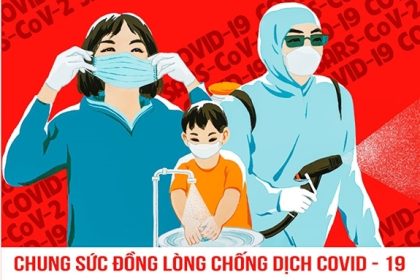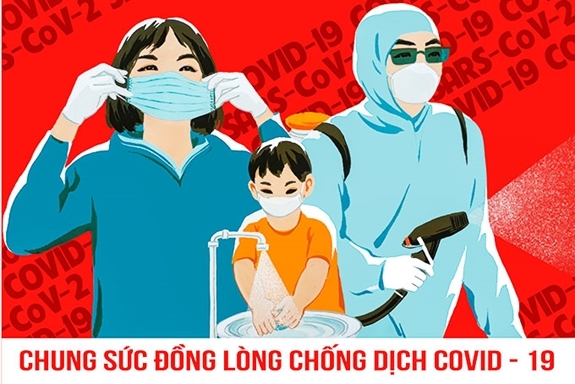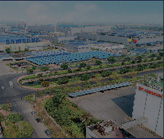
1. Guidelines for testing SARS-COV-2 at production and business facilities
The recommendation was made as part of an urgent document (NO. 8228/BYT-MT) sent on September 30 by the ministry to governmental agencies, sectors, provinces and centrally-run cities regarding SARS-CoV-2 testing for business and production facilities.
The move was made after Prime Minister Phạm Minh Chính directed the MoH to urgently issue COVID-19 self-testing guidelines for enterprises, thus creating favourable conditions for them to stay proactive in their business activities while ensuring safety in pandemic prevention and control.
According to the COVID-19 self-testing guidance issued on September 30, the ministry has proposed conducting screening tests for all cases of employees with suspected COVID-19 symptoms such as cough, fever, and shortness of breath, and those with related epidemiological factors.
For enterprises in high-risk provinces and cities, real time RT-PCR or rapid antigen tests are required every week for 20 per cent of high-risk workers and all direct service providers to the facilities.
For those in localities at risk, real time RT-PCR or rapid antigen tests are required at least twice a week for at least 5-10 per cent of high-risk workers and all direct service providers to the facilities.
The ministry said enterprises must be solely responsible for the quality of antigen tests, testing procedures and results.
If enterprises implement the SARS-CoV-2 antigen rapid test themselves, they must take guidance from the provincial centre for disease control or the district health centre, it said.
Meanwhile, drivers transporting goods from an area with social distancing measures to neighbouring areas with lower risk of infection must have this testing performed at medical facilities.
Recently, several local media outlets said enterprises had faced difficulties in production recovery due to the serious shortage of workers and different COVID-19 testing requirements in localities. — VNS.

2. Labour Confederation proposes health insurance premium exemption to 01/2022
The Vietnam General Confederation of Labour (VGCL) has proposed an eight-month exemption of health insurance premiums, until January next year, for labourers and firms victimised by COVID-19.
The beneficiaries include workers whose labour contracts are suspended or those who have to leave their jobs without any salaries at firms, public and private primary and secondary educational establishments during the time of temporary closure to curb the spread of the pandemic.
An estimated budget of 33.6 billion VND (1.46 million USD) is set to support 50,000 people.
The VGCL also asked the Government to add more pandemic-hit workers into the list of beneficiaries.
It put forward assistance in cash for workers who had to stop working in over two weeks for they must stay in concentrated quarantine facilities, at their accommodations or sealed off areas.
Some 60 billion VND sourced from the State budget will be earmarked for 60,000 people from June 1 until the end of this year./..
3. Small and medium-sized businesses supported 50% of the value of technology transfer consultancy contract
It is one of the new contents stated on Decree No. 80/2021/ND-CP of the Government dated August 26th, 2021 on regulating and instructing the enforcement of the law on support for small and medium-sized enterprises (SMEs).
Accordingly, SMEs are eligible to be supported the maximum of 50% of the value of technology transfer consultancy contract, but no more than VND 100 million/contract/year/enterprise; 50% of the value of the contract on digital transformation measures for business process, administration, manufacture, technology and business model transformation but no more than VND 50 million/contract/year/small enterprise and VND 100 million/contract/year/medium-sized enterprise.
Besides, enterprises are supported the entire cost of startup training courses and up to 70% expense of SMEs business administration training course. They are eligible to freely access and attend online lectures available on the online training system of Planning and Investment Ministry and the provincial People’s Committee, etc.
In addition, SMEs joining in start-up, industrial cluster or value chain will be given an interest rate support when applying for medium and long-term loans from credit institutions to carry out their manufacture or business projects. Through credit institutions, National Bank applies the interest rate differential of 2%/year to the loans of SMEs joining in industrial cluster and value chain.
The Decree is valid since October 15th, 2021..
4. Vietnam approves 30% CIT reduction
The Government has decided to implement a 30 per cent corporate income tax (CIT) cut for certain businesses for the 2020 financial year.
Việt Nam’s National Assembly on June 19 ratified the Government’s proposal to cut corporate income tax by 30 per cent.
According to Decree No 114/2020/NĐ-CP, all enterprises, co-operatives, agencies and organisations established under Vietnamese law and generating income of no more than VNĐ200 billion (US$8.58 million) a year are eligible. The 30 per cent reduction is only applicable to income generated in 2020.
In cases of a newly established enterprise or those which have changed their form, ownership, or have undergone consolidation, merger, acquisition, dissolution or bankruptcy in a month, the operation period shall be counted for the full month.
In cases where the enterprise expects total revenue in the 2020 corporate income tax period to not exceed VNĐ200 billion they shall determine the quarterly temporary payment equal to 70 per cent of the payable CIT amount of the quarter.
Recently, the Board for Private Economic Development Research proposed a 30 per cent CIT reduction for all businesses in 2020, instead of only applying to businesses with total revenue of less than VNĐ200 billion.
The board also proposed to reduce value-added tax from the current 10 per cent to 5 per cent with an aim to stimulate consumption..









